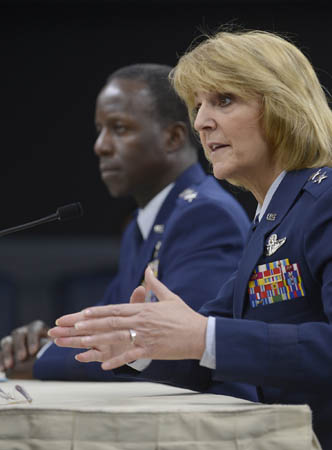
July 1, 2013—There has been intense energy throughout the Defense Department and Congress over t he past few months as leaders tackle a growing and disturbing trend in military sexual assaults. As part of that movement, the Air Force’s Sexual Assault Prevention and Response Office is making significant structural changes to strengthen its efforts to combat the issue.
he past few months as leaders tackle a growing and disturbing trend in military sexual assaults. As part of that movement, the Air Force’s Sexual Assault Prevention and Response Office is making significant structural changes to strengthen its efforts to combat the issue.
In addition to overhauling the SAPR office makeup, the Air Force has plans to increase its reach and capability. Senior officials announced June 6 that Maj. Gen. Margaret Woodward would lead the SAPR office, which serves as the core of the Air Force’s effort to reduce sexual assault within the ranks and to provide victims the support they need. Woodward previously oversaw the command-directed investigation into sexual misconduct at Basic Military Training and all other Air Education and Training Command units.
“No one cares more about fixing this issue than we do,” said Woodward in a statement to Air Force Magazine. “Not only because this is our family, but also because our lives inherently depend on our trust in our wingmen. We must restore the trust of the American people and, more importantly, the trust our airmen have in each other.”
The changes aligned the office directly under the Air Force vice chief of staff, raising it to a directorate level as opposed to the branch-level position it previously held.
The Air Force also intends to expand the size and scope of the office, starting with personnel. Authorized manning will increase from four people to around 30—all with a range of skill sets, said Lt. Col. Jill Whitesell, spokeswoman for the SAPR office. The Air Force also will add an analysis team to take a more analytical and methodical approach to eradicating the problem.
“We have been doing a lot of talking on this issue, but now it’s time for us to listen,” Whitesell said. “It is very important for the Air Force to understand what contributes to sexual assault and for us to focus our efforts in the right direction.”
Airmen are expected to play a direct role in the changes too. Going forward, they will be asked to participate in cultural surveys and focus groups. “We want every airman to be a part of the solution, and by participating in these data polls, [it] will help ensure we are addressing the issues at their root cause.”
The new SAPR office will incorporate some social media elements as well, developing a blog as an attempt to create a platform for open dialogue where airmen can express ideas and thoughts on topics related to sexual assault prevention and response.
While the structural and staff improvements have no set timeline, Whitesell said it needs to be a top priority for Air Force leadership. “We are trying to build the team as quickly as possible in order to move forward with assessing and addressing the issues,” she added.
The reorganization of the Air Force SAPR office follows a May directive from Defense Secretary Chuck Hagel aimed at bolstering the Pentagon’s response to the issue. The initiatives outlined by Hagel include more transparency in accountability and methods to incorporate the rights afforded victims under the Crime Victims’ Rights Act into military justice practice. That same month, Hagel also ordered all sexual assault prevention and response personnel and military recruiters to be retrained, re-credentialed, and rescreened.
On Capitol Hill, H.R. 1864—a bill that strengthens protections of sexual assault victims in the military—unanimously passed in the House on June 27. The legislation, sponsored by Rep. Jackie Walorski (R-Ind.), requires military inspectors general to investigate allegations of retaliatory personnel actions taken in response to reporting crimes related to sexual assault.

